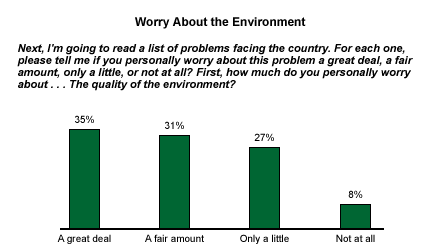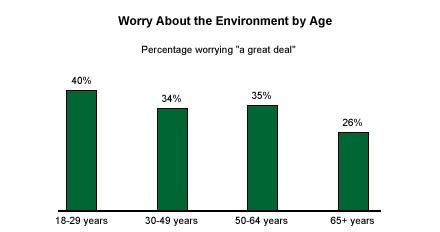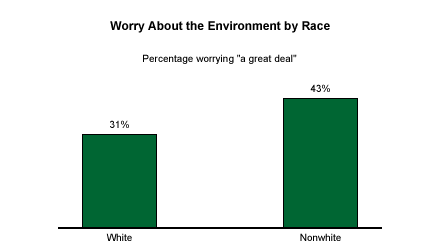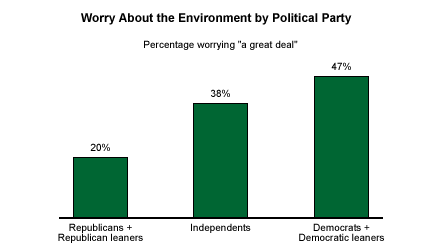As people prepare to celebrate Earth Day on Friday, a recent ���۴�ýPoll finds two-thirds (66%) of Americans personally worried about the quality of the environment. In March, respondents were asked to rate their level of worry with several political and social issues*. Thirty-five percent say they worry "a great deal" and 31% say they worry "a fair amount" about the environment. The environment usually ranks near the bottom of the list of Americans' concerns, behind such issues as healthcare, crime, and drug use.

A United Nations report issued on March 30 indicates there's a lot to worry about. The Millennium Ecosystem Assessment, prepared by 1,300 experts in 95 countries, estimated that "60% of the benefits that the global ecosystem provides to support life on Earth (such as fresh water, clean air and a relatively stable climate) are being degraded or used unsustainably." ���۴�ýpolling shows that most Americans are sensitive to protecting the environment at some level -- they say it should be given a higher priority over both economic growth and development of energy supplies. However, they express a greater degree of concern about more immediate issues in their lives -- such as the cost of healthcare and crime.
The Environment and Age
Aggregated polling data on this question** show that concern for the environment typically declines with age. The youngest generation is going to spend the most time on the planet, so it makes sense that 40% of 18- to 29-year-olds worry a great deal about the quality of the environment. But there are exceptions to every rule. "I have things to worry about other than the environment," says a 29-year-old respondent from Michigan who worries only a little. "Besides," she continues, "we take care of the environment here. I live by a river, we have five parks and several lakes nearby, and there is a lot of conservation in this area. I don't have to worry about it."
On the other hand, a 48-year-old respondent from Virginia worries "a great deal" about the environment. "I'm an ecologist who has worked on environmental projects in Nicaragua and the Ukraine, so that probably explains why I worry so much about it," he says. "But we have to balance our resource needs with environmental protection. Of course, we need to develop alternate sources of energy, but there are ways to drill in the Arctic National Wildlife Refuge without damaging the Alaska wilderness."

The Environment and Race
The quality of the environment concerns nonwhites significantly more than whites, 43% compared with 31%. According to reports from the National Institute of Environmental Health Sciences, minority neighborhoods are more likely than other areas to experience environmental health hazards: "Minority neighborhoods tend to have higher rates of mortality, morbidity, and health risk factors compared with white neighborhoods, even after accounting for economic and other characteristics."

The Environment and ���۴�ý
Just one-fifth (20%) of Republicans worry a great deal about the environment, compared with almost half (47%) of Democrats. One 41-year-old GOP respondent from North Carolina, who says she worries only a little about the environment, justifies her views this way: "I believe what the Bible tells us -- the Earth is wearing out, it's the natural order of things, and I don't spend time worrying about it."
When asked what she thinks might explain the broad political disparity between Republicans and Democrats, she says "more Republicans are Christians who go to church often; they have more inner peace, less worry." Although her reasoning may be open to further interpretation, the data do indicate a difference between those who attend church frequently and those who seldom or never attend religious services. Forty percent of Americans who seldom or never attend church worry a great deal about the quality of the environment, compared with 28% of those who attend church weekly.
Another Michigan woman, also a Republican, offered her take on the differences. "Democrats are stereotypically liberal -- more touchy-feely," she says. "Republicans tend to worry about immediate concerns, like our pocketbooks and our health."

*These results are based on telephone interviews with a randomly selected national sample of 1,008 adults, aged 18 and older, conducted March 7-10, 2005. For results based on this sample, one can say with 95% confidence that the maximum error attributable to sampling and other random effects is ±3 percentage points. In addition to sampling error, question wording and practical difficulties in conducting surveys can introduce error or bias into the findings of public opinion polls.
**Results are based on telephone interviews with 3,017 national adults, aged 18 and older, conducted March 7-10, 2005, March 8-11, 2004, and March 24-25, 2003. For results based on the total sample of national adults, one can say with 95% confidence that the margin of sampling error is ±2 percentage points.
